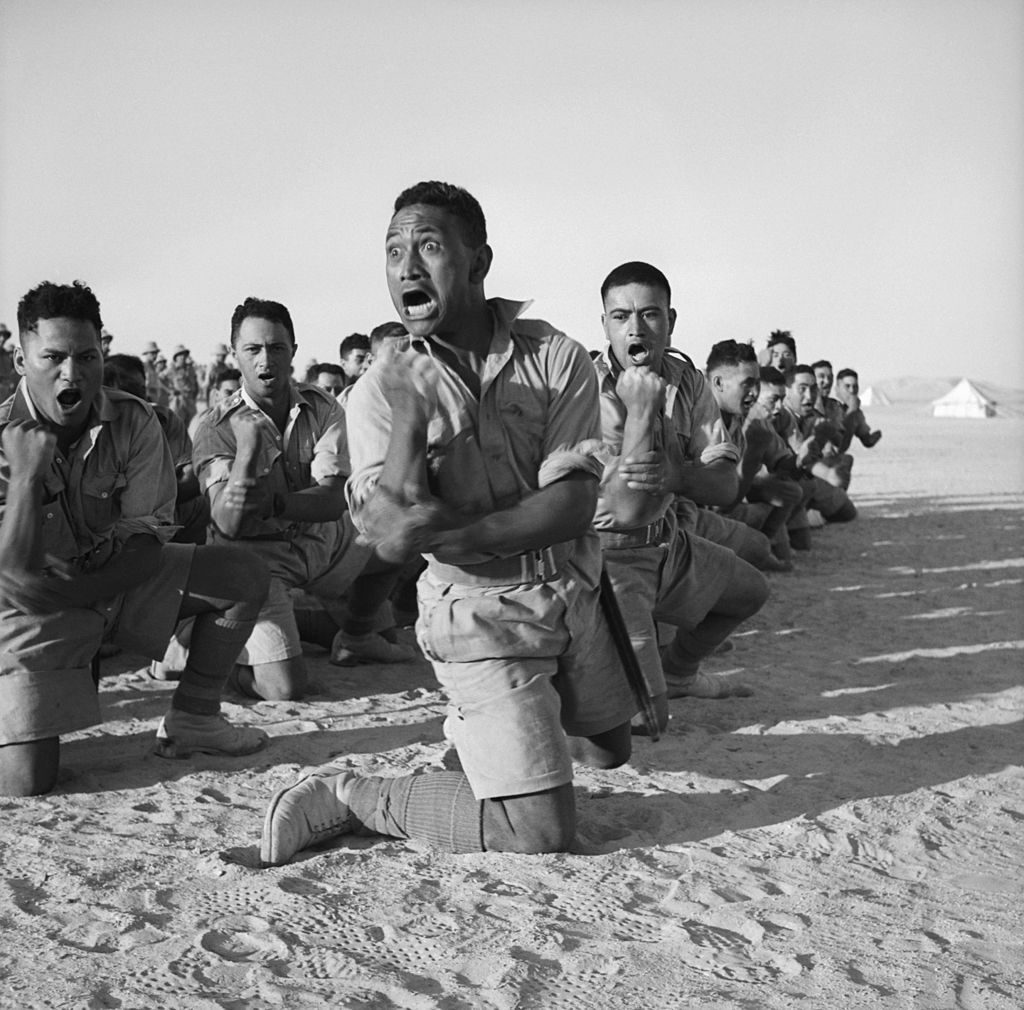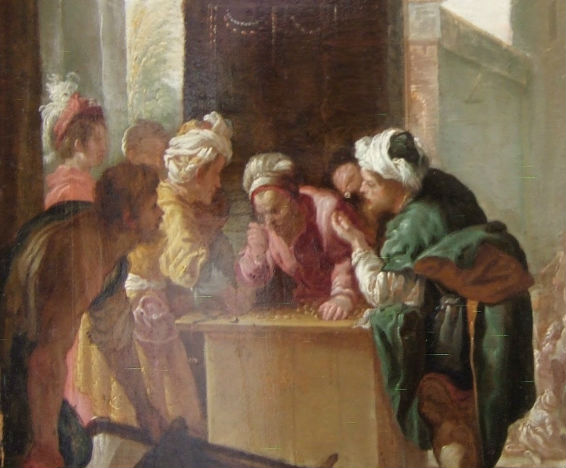This post is part of the General Conference Odyssey.

 Essentially all of my writing—for the General Conference Odyssey, for blog posts, in fiction that very few people have seen—is about connections. Some times, however, I don’t fully understand the connections myself. This may be one of those times.
Essentially all of my writing—for the General Conference Odyssey, for blog posts, in fiction that very few people have seen—is about connections. Some times, however, I don’t fully understand the connections myself. This may be one of those times.
One of the books I read recently that really stuck with me was Robert Leckie’s World War II memoir, Helmet for My Pillow. The conclusion to his book is haunting, and I want to quote some of it here:
It is to sacrifice that men go to war. They do not go to kill. They go to be killed, to risk their flesh, to insert their precious persons in the path of destruction… That is why women weep when their men go off to war. They do not weep for their victims. They weep for them as victim. That is why, with the immemorial insight of mankind, there are gay songs and colorful bands to send them off: to fortify their failing hearts, not to quicken their lust for blood. That is why there are no glorious living, but only glorious dead. Heroes turn traitor. Warriors age and grow soft. But a victim is changeless. Sacrifice is eternal.
This is the exact quote that came to mind as I read Elder Hales’ talk, A Question of Free Agency. It is one of the most unusual General Conference talks that I have ever read, even by the standards of the often-awkward first talks from the newly-called. What I found most remarkable about the talk was the bittersweet tone that pervaded it. It seems to me that many Mormons look to high leadership calling as a kind of badge of honor, a privilege to be dreamt for, but obviously that was not Elder Hales’ attitude. When he got the call—out of the blue—to give up his career and serve he was clearly devastated. As he put it, “The call was clear. I had to let go of everything that I had known and what I had been striving for in my life to become an Assistant to the Twelve.”
And so his talk touches on the law of consecration and even laying down your life:
I have learned from Joseph Fielding Smith, and have talked to young people, about the law of consecration. It is not one particular event; it is a lifetime, day by day, in which we all strive to do our best that we might live honorable lives, that we might live the best we can in the service of others, as President Joseph Fielding Smith talked about—not as his grandfather, Hyrum Smith, gave his life when he was with the Prophet, but giving our lives each day.
These are not the sentiments of a man who has achieved a life-long ambition. They are the sentiments of a prisoner on his way to the slow-motion gallows. A calling that plenty of Mormons have coveted—and still covet—was a sacrifice for Elder Hales, leading him to say, “It is not in death or in one event that we give our lives, but in every day as we are asked to do it.”
Lots of newly called leaders ask “Why me?” The question usually arises from humility: how can I live up to this great calling? But Elder Hales’ “Why me?” is more raw and visceral, much less “How can I do this?” and much more, “Why did this have to happen to me?” Thus:
One cannot ask the question “Why me?” and dwell on it. But I will do as the prophet has said, to put behind me my past life and dedicate and consecrate all my time, talents, and efforts to His work.
I think that’s why it reminded me so much of Leckie’s sentiments about sacrifice in war. I’m not equating the two; they are very different. Elder Hales said as much himself. But there is a common thread, and that thread is sacrifice. Giving up dreams. There’s one more quote that comes to mind, this one from J. M. Barrie’s Peter Pan,
Mrs. Darling: There are many different kinds of bravery. There’s the bravery of thinking of others before one’s self. Now, your father has never brandished a sword nor fired a pistol, thank heavens. But he has made many sacrifices for his family, and put away many dreams.
Michael: Where did he put them?
Mrs. Darling: He put them in a drawer. And sometimes, late at night, we take them out and admire them. But it gets harder and harder to close the drawer… He does. And that is why he is brave.
There’s been a lot of hubbub recently about the fact that General Authorities receive a stipend. For the most part, I consider the entire conversation unworthy of reply. (I did engage once on Facebook. Of course I regretted it.) I’ll talk about transparency and accountability—and why such principles have nothing to do with our relationship to the Church—another time. For now, let me just point out the obvious: in accepting this calling Elder Hales was not fulfilling an ambition or securing an easy paycheck. He was giving up on every dream he and his wife had had for their lives. There are very few sacrifices more precious than our dreams, and that is precisely what Elder Hales was asked to lay upon the altar. And yet he did. And then he went out and spoke before the world of the importance of consecration. He was called, and he was answered. To denigrate his service—or the service of the other General Authorities—as somehow corrupt, or unseemly, or embarrassing is foolishness. And, as the Lord told Moroni, “Fools mock, but they shall mourn.” The Lord’s “grace is sufficient for the meek, that they shall take no advantage of your weakness.”
That’s what I see in Elder Hales’ talk, the meekness and weakness of someone whose hands shook as he lay his offering on the altar. There was nothing majestic or grandiose in his sacrifice. It was quiet and one could easily dismiss it as inconsequential compared to the sacrifices that others have made.
But I, too, have dreams. And when I think about what it would take for me to voluntarily abandon all of them, my heart quails in sympathy with Elder Hales’. He was meek. He was weak. He was definitely a hero in the Samwise Gamgee mold rather than the Aragon or Faramir mold. But when he abandoned his dreams, he became God’s.
Let the fools mock, and bear them no grudge. Elder Hales’ reward wasn’t of this Earth and—if we are able to follow his example—neither will ours.
—
Check out the other posts from the General Conference Odyssey this week and join our Facebook group to follow along!
 In preparation for an upcoming talk in church on “trials and their purpose,” I purchased Eastern Orthodox philosopher David B. Hart’s book The Doors of the Sea: Where Was God in the Tsunami?. Written after the massive South Asian tsunami in 2004, Hart addresses the most common objection to God’s existence: the problem of evil. Instead of intellectualizing, justifying, and rationalizing the evil and suffering we see and experience in the world, Hart condemns it. He reminds readers that Christ was sent to conquer death and all those things associated with it. In short, death, evil, and suffering play no role in God’s ultimate purposes because these are the very things Christ’s atonement and resurrection are meant to be victorious over. Hart movingly concludes his book with the following:
In preparation for an upcoming talk in church on “trials and their purpose,” I purchased Eastern Orthodox philosopher David B. Hart’s book The Doors of the Sea: Where Was God in the Tsunami?. Written after the massive South Asian tsunami in 2004, Hart addresses the most common objection to God’s existence: the problem of evil. Instead of intellectualizing, justifying, and rationalizing the evil and suffering we see and experience in the world, Hart condemns it. He reminds readers that Christ was sent to conquer death and all those things associated with it. In short, death, evil, and suffering play no role in God’s ultimate purposes because these are the very things Christ’s atonement and resurrection are meant to be victorious over. Hart movingly concludes his book with the following:

 Adam was placed in the Garden of Eden “to dress it and to keep it” (Genesis 2:15). Labor is not only the destiny of man; it is endowed with divine dignity. However, after he ate of the tree of knowledge he was condemned to toil, not only to labor “In toil shall thou eat … all the days of thy life” (Genesis 3:17). Labor is a blessing, toil is the misery of man. The Sabbath as a day of abstaining from work is not a depreciation but an affirmation of labor, a divine exaltation of its dignity. Thou shalt abstain from labor on the seventh day is a sequel to the command: Six days shalt thou labor, and do all thy work [Ex. 20:9]…The duty to work for six days is just as much a part of God’s covenant with man as the duty to abstain from work on the seventh day.[ref]
Adam was placed in the Garden of Eden “to dress it and to keep it” (Genesis 2:15). Labor is not only the destiny of man; it is endowed with divine dignity. However, after he ate of the tree of knowledge he was condemned to toil, not only to labor “In toil shall thou eat … all the days of thy life” (Genesis 3:17). Labor is a blessing, toil is the misery of man. The Sabbath as a day of abstaining from work is not a depreciation but an affirmation of labor, a divine exaltation of its dignity. Thou shalt abstain from labor on the seventh day is a sequel to the command: Six days shalt thou labor, and do all thy work [Ex. 20:9]…The duty to work for six days is just as much a part of God’s covenant with man as the duty to abstain from work on the seventh day.[ref]


